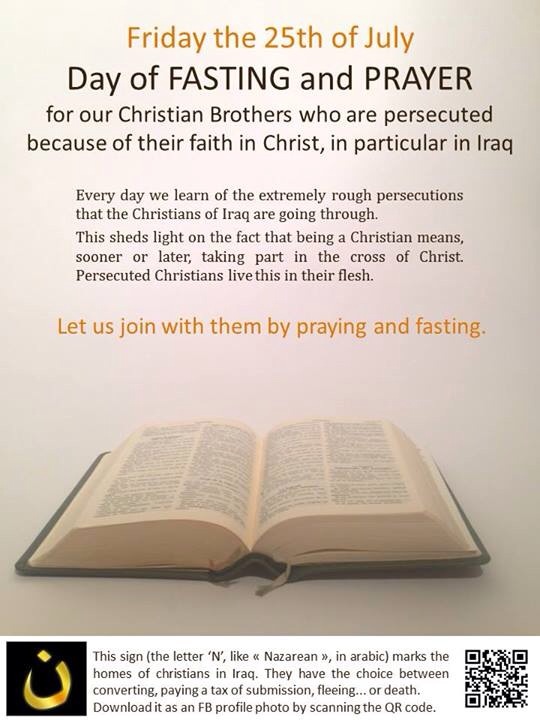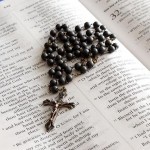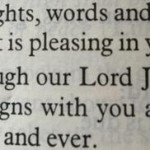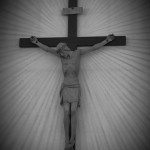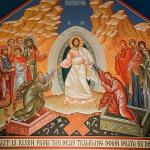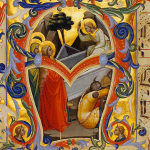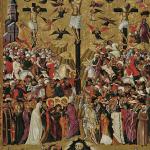“Elizabeth, if I think too much about it I just break down. So many shrines I have visited destroyed. So many brethren I have know. battered, beaten or dead. Absolutely devastating.”
That’s a quick note from my friend, Michael LaCivita. Having worked for the Catholic Near East Welfare Association for decades, he knows and loves these places, knows and loves the people who are looking into the face of evil — true evil, the all-too-familiar kind of evil that keeps resurfacing throughout world history. It is the evil that comes forward when some human beings cease to see other human beings, as creatures as equally beloved of God as they are themselves; they see them instead as something less-than-human; sub-creatures meant to be either subjugated or swept from the face of the earth. For them, there is no other, more reasonable and less extreme choice.
We had been discussing the awful news and images out of Mosul and elsewhere, and I had confessed my heartbreak, the difficulty I was having with the reality that our ancient Christian roots — our ancestral places, so to speak, many founded well before the advent of Islam — have been so quickly overtaken, so thoughtlessly and eagerly eaten up by such a conflagration of hate.
That is when I heard his own pain, and worse. Our encounter occurred just as he’d finished communicating with sources on the ground, people who are seeing much more than we’re being told. Michael dared not say much, but he related this from the Syrian Maronite Bishop Sleiman, a sense of things as they are: “Flattened. Everything is just flattened. Destroyed.” People’s spirits are crushed; they have nothing, and are wholly dependent on aid; they are displaced, and in shock, and without the will to engage in the difficult work of surviving.
 Orwell said “The most effective way to destroy people is to deny and obliterate their own understanding of their history.” Another way is to simply obliterate their history entirely, give them no connection to their past, no standing reflection of who they are; in this way they become nobodies: people with no past to point to, no footpath to refer back to, so as to gauge a way forward. What a despicable robbery.
Orwell said “The most effective way to destroy people is to deny and obliterate their own understanding of their history.” Another way is to simply obliterate their history entirely, give them no connection to their past, no standing reflection of who they are; in this way they become nobodies: people with no past to point to, no footpath to refer back to, so as to gauge a way forward. What a despicable robbery.
“Flattened. Destroyed.” It is unthinkable, and in a post-Christian West — where “tolerance” and “co-existence” are popular concepts of enlightenment, and an expedient political dynamic — this devastation is going almost unmentioned. A bloody, oppressive and culturally catastrophic War on Christians? Not half as interesting, to the West, as Snoop getting high at the White House.
Word on Fire’s Father Robert Barron observes:
Though you would never guess it from the paucity of coverage in the major news media, there is a fierce persecution of Christians going on in the Middle East. In Egypt, convents and churches are being burned to the ground and Copts, members of one of the most ancient Christian communities, are being routinely harassed, tortured, and arrested. In Iraq, the ISIS group, hoping to re-establish a “caliphate” across the northern sector of the Middle East, is brutally persecuting Christians. . . And the sheer shock of these extreme instances can allow us to overlook the fact that in Saudi Arabia Christians are not permitted to build churches or to practice their faith publicly in any way.
He goes on to note Pope John Paul II’s observation that religious freedom is fundamental to the right-orientation of society, itself, and that Pope Benedict XVI, in his controversial Regensberg remarks of 2006, pointed out that conversion coercion “through bodily persecution cannot even in principle awaken authentic faith.” Which means that at its root, a forced conversion is both irrational and dishonest; it does not, cannot, give glory or witness to anything but brute force, dehumanization and wickedness. It is a lie, and therefore a sin, against the very God it purports to serve.
Barron asks a troubled question:
. . . Christians over the centuries have done terrible things in the name of God and that the overwhelming majority of Muslims are peaceful and non-violent. But I think it is clear that when Christians act in such a way, they are unequivocally at odds with their own conception of God. Is the same true of Muslims?
One faithful Muslim, suggests that it is. Dilshad Ali, managing editor of the Muslim channel, writes this:
That ISIS even refers to itself as the “Islamic State” in Iraq is loathsome to millions of Muslims around the world who know what they are doing is unIslamic and against the teachings of our beloved Prophet Muhammad. To force Christians to flee, to destroy churches – this isn’t the Islam that was taught to us and carried in so many of our hearts for hundreds of years. . .Ya Allah, forgive those among us who are hurting so many, who are twisting the words of faith and engaging in inhumanity. Give us the strength to push for justice, for good, for love and light, for peace and harmony.
I urge you to read both pieces in their entirety, and to continue to do the things we can do for the sake of these ancient Christians, and their Muslim neighbors, too — those with whom they have lived peaceably and who now must watch this inhumane persecution, or lose their own lives in resistance to it.
Reading Ali’s piece, and then Barron’s, I could not help thinking of Saint Francis and the Sultan of Egypt, Malik al-Kamil. They managed respect for each other, while still keeping to their respective faiths. It shouldn’t be so difficult to replicate that, should it, in this day and age? After all, our era is reportedly much more humanely advanced than the Middle Ages.
But this led me to think of a 6th Thing We Can Do, in addition to these five: let us call on the great Cloud of Witnesses who have preceded us in our 2,000 year history, and ask them for their prayers before the Throne: Saint Francis, himself, friend of the Sultan. The Maronite monk, Saint Sharbel Maklouf. Saint Macarius the Great, of Egypt. Blessed Mary of Christ Crucified the Syrian Carmelite known in Palestine as “Al Qiddisa” (The holy one). Amma Syncletica of Alexandria, the Desert Mother. Blessed Charles Eugène de Foucauld, martyr. Saint James the Greater.
As I said yesterday, we are not powerless; we are in possession of the most subversive weapon of ambush, which is prayer, which moves through and pours forth from time and space, intercepting and impacting our times, beyond what we can comprehend.
Our brothers and sisters in the ancient province of Nineveh are fleeing, shocked and without hope. They are “Flattened, destroyed.” They have been pulled off of long-traveled footpaths and watched them become erased before their eyes. It might be too early for them to realize that, in the supernatural way of Christ, their stronghold and inheritance remains — that there is still a path to follow, and a future. But we must help them to know it, to feel it within, by the force of our prayers, our fasting, our alms.
In my life, I have known when people are praying for me. I have felt it; been sustained by it. Help them to feel it.
UPDATE: Just saw this on Facebook. I didn’t organize and I don’t know who did, but interestingly enough, on the Catholic calendar Thursday, July 24 is dedicated to Saint Sharbel Maklouf, and Friday the 25th is the feast of Saint James. Make of it what you will.

